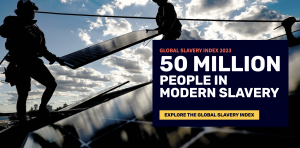
MAY 24, 2023- The 2023 Global Slavery Index, a flagship publication created by Walk Free, in conjunction with the ILO and IOM, effectively captures the grim reality of global slavery in over 160 nations. Since its 2018 Report, the Index examined more than 160 nations and the existence of modern slavery around the world using several fundamental metrics: prevalence, vulnerability, and government response. The dimension of prevalence analyzes hundreds of interviews with survivors gathered from various nations to determine the extent of modern-day slavery globally. By utilizing a model created to help identify and better understand what motivates this crime, the research evaluates how exposed individuals in a nation are to modern slavery and in what ways, under the vulnerability dimension. The research assesses national governments’ efforts in 176 nations to abolish slavery in order to gauge government reaction, stressing the programmatic, policy, and legal measures that governments implement to address modern slavery.
As of 2021, 50 million people are trapped in some form of modern slavery, a significant rise from the estimated 40.3 million persons who were estimated in 2018. The Index also reveals that Asia and the Pacific, with 29.3 million slaves, accounts for approximately 60% of all reported cases worldwide.
7 million of the 50 million individuals reported to be living in modern slavery worldwide live in Africa.
Prevalence in Nigeria
The Index examined varying forms of contemporary slavery to determine how widespread it is throughout Nigeria, estimating that 1.6 million people were living in modern slavery on any given day in 2021 (as against 1.3m in 2018). These included forced labor exploitation, forced commercial sexual exploitation of both adults and children, forced marriage, and organ trafficking. Findings showed that instances of forced labor are common in the unregulated informal economy, with domestic slavery having a disproportionately negative impact on women and girls. Regarding forced sexual exploitation, it is known that traffickers lure women and girls into conditions of modern slavery abroad by making false promises of paid employment in the sex industry or other fields. According to estimates, 30% of Nigerian women between the ages of 20 and 24 were initially married or in a union prior to turning 18 years old. A number of factors contribute to child marriage, with women from rural areas, lower-income households, or those with less education being disproportionately affected. Forced marriage is another widespread form of modern slavery in Nigeria. Overall, Nigeria placed 5th of the 51 nations in the region in terms of the prevalence of modern slavery and 38th out of the 160 countries ranked (as against 32/167 in 2018).
Vulnerability in Nigeria
According to the Index, the largest vulnerability to modern slavery is in Africa and the Americas due to inequality, while the highest vulnerability is reflected in the Arab States and Africa due to the effects of conflict. To put the issue of vulnerability in context, various drivers of this crime in Nigeria were investigated. Nigeria was identified as being among the most susceptible nations in both the African region and in the world, with a rating of 76/100 (as against 74/100 in 2018).
The effect of conflict on contemporary slavery in Nigeria was also emphasized as one of the primary causes of the crime. Millions of people have fled Nigeria as a result of the protracted conflict, extensive displacement, indiscriminate attacks against civilians, and other factors, both within the nation and to other countries.
According to the report, gender inequality-related behaviors and viewpoints increase risk for women and girls in Nigeria. The disparities experienced by women and girls in Nigeria were highlighted as being magnified by poverty, along with governmental problems such as rampant corruption, which increase vulnerability by obstructing criminal justice procedures and preventing action to hold traffickers accountable for their crimes.
Government response
With a score of 54%, Nigeria had the strongest response to modern slavery of all African countries, according to the Index. This indicates that Nigeria has adopted slightly over half of the government-required measures to prevent modern slavery. The government’s strongest efforts were said to be focused on finding and helping survivors. Government-run shelters for survivors do, however, confront a number of obstacles that limit the extent to which they can help survivors. The Report noted that the shelters typically do not maintain enough supplies to provide survivors with more than six weeks of housing.
Additionally, the effectiveness of support services for survivors in Nigeria is compromised by legal framework gaps and a failure to enforce protections. Additionally, it was noted that despite the prevalence of forced and child marriage in the nation, and despite Nigeria’s ratification of pertinent agreements aimed at ending discrimination against women and ending child marriage, the government has not yet successfully addressed these issues. Although the federal Child Rights Act forbids marriage before the age of 18, not all states have enacted the law, and forced marriage is not specifically criminalized as a crime. The Child Rights Act is threatened by Nigeria’s heterogeneous legal system, where many residents follow Islamic and customary law.
The Index offered a few recommendations to enhance government responses to modern slavery. They entail addressing the gaps in the support services that are available for people who have experienced modern slavery, ensuring that survivors of exploitation are not punished or detained for crimes committed while in the care of criminals, including children recruited by armed groups, as well as ensuring adequate protection in national legislation, such as by making it illegal to force someone to marry and forbidding the use of children in armed conflict. The report also recommended setting aside funds specifically for the National Action Plan on Human Trafficking in Nigeria’s implementation, increasing the legal minimum age of marriage for both girls and boys in every state to 18, without exception, and making sure there are enough labor inspectors to cover the size of the workforce and that regular inspections are conducted in the informal sector.


Recent Comments